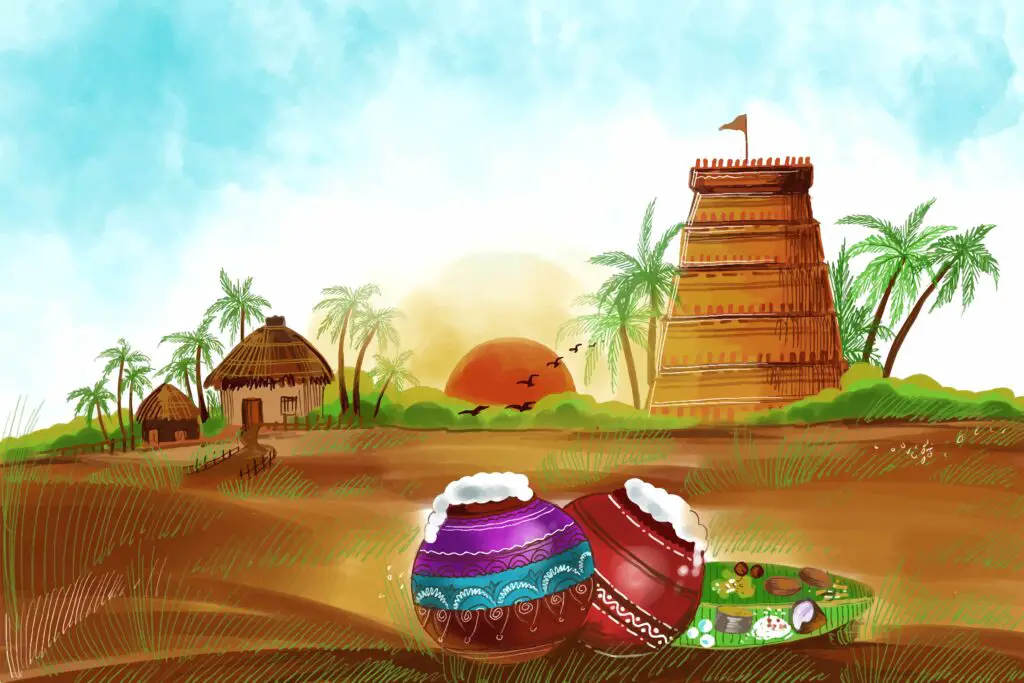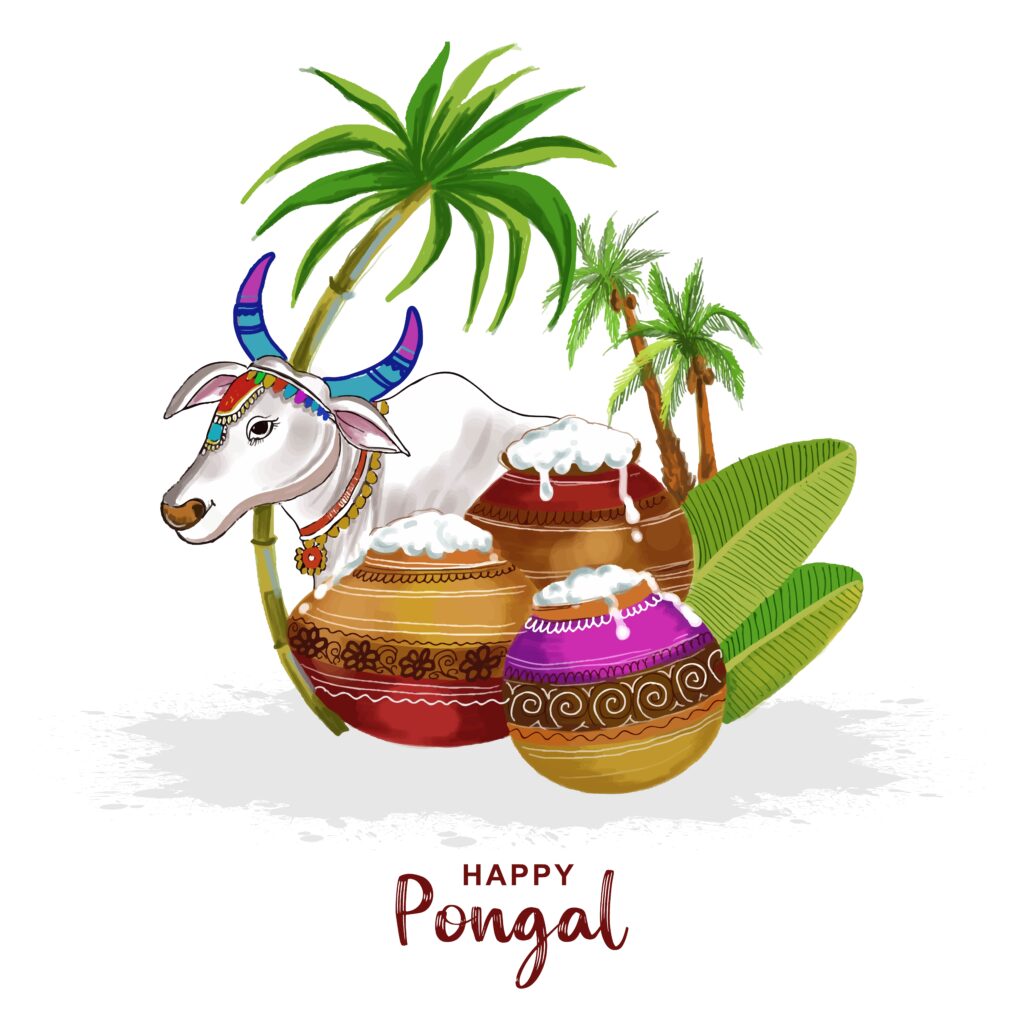What is Pongal ??
Pongal, a traditional South Indian festival, is a time of great rejoicing and delectable feasting. It holds a special place in the hearts of people as it not only marks the bountiful harvest but also symbolizes unity, gratitude, and new beginnings. In this article, we’ll dive into the vibrant world of Pongal, exploring its significance, the joyous celebrations, and the mouthwatering recipes that make this festival truly special.

Table of Contents
Introduction
It is known as “Thai Pongal,” falls in mid-January, coinciding with the auspicious Tamil month of Thai. The festival is all about expressing gratitude to the Sun God for an abundant harvest, making it a blend of agricultural significance and cultural celebrations.

The Significance of Pongal
It is more than just a harvest festival; it’s a time when farmers thank nature for its blessings and pray for continued prosperity. The freshly harvested rice is symbolically cooked in clay pots to signify abundance and fertility. Families come together to offer their gratitude for the year’s harvest.

The Four-Day Celebration
Bhogi: The Bonfire Festival
The celebrations commence with Bhogi, where old possessions are discarded, and a bonfire is lit. The cleansing signifies the removal of negativity, making way for new and positive energy.
Thai Pongal: Cooking Up Joy
The main event, Thai Pongal, is a day of joyful cooking. Colorful kolams (rangoli) adorn the entrances of homes, and families gather to prepare a special dish using the newly harvested rice, jaggery, and milk.
Mattu Pongal: Worshiping Cattle
On this day, cattle are honored for their vital role in agriculture. They are bathed, decorated, and worshipped as a gesture of gratitude.
Kaanum Pongal: Bonding and Sightseeing
Kaanum is about spending quality time with family. People visit relatives, enjoy traditional foods, and often go sightseeing.
Mouthwatering Pongal Recipes
Ven Pongal: The Classic Comfort Dish
Ven a savo,ry dish made with rice and lentils, is a staple during Pongal. It’s often served with spicy coconut chutney and crispy fried vadai.
Sakkarai Pongal: Sweetness Overloaded
Sakkarai , a sweet rice pudding, is the star of the festival. Cooked with jaggery, ghee, and cashews, it’s a divine indulgence.
Milagu Pongal: A Pepper-infused Delight
Milagu is a spicy variant, featuring pepper and cashews. It’s not only delicious but also believed to keep the body warm during the winter.
Pongal Sambar: The Perfect Accompaniment
No Pongal feast is complete without Pongal Sambar. This tangy and flavorful lentil stew pairs perfectly with the festive rice dishes.
The Cultural Significance
It transcends its agricultural roots to represent unity. It brings families together, fosters a sense of belonging, and showcases the rich cultural heritage of South India.
Decorations and Rangoli
Homes are adorned with colorful rangoli, adding a touch of vibrancy to the festive spirit. These intricate designs are a feast for the eyes.
Joy and Togetherness
It is a time of laughter, bonding, and making cherished memories. The act of cooking and sharing meals reinforces the bonds within families.
Pongal Around India
While Pongal is widely celebrated in Tamil Nadu, similar festivals are observed across India, such as Makar Sankranti in other regions.
Modern Twists to Traditional Recipes
Contemporary chefs are putting innovative twists on traditional Pongal recipes, introducing variations that appeal to diverse palates.
Sustainable Celebrations
With a growing emphasis on sustainability, Pongal celebrations are becoming more eco-friendly, promoting a greener way of rejoicing.
Pongal’s Global Presence
Thanks to the Indian diaspora, Pongal is celebrated globally. It serves as a bridge between cultures and an opportunity to share traditions.
The Aroma of Fresh Beginnings
The fragrance of ghee, spices, and freshly cooked rice during Pongal signifies not only a feast for the senses but also the start of new beginnings.
FAQs About Pongal
Q1: When is Pongal celebrated each year?
It falls on January 14th or 15th, depending on the Tamil calendar.
Q2: What is the history behind Pongal?
It’s history dates back to ancient Tamil agricultural practices, honoring the Sun God and celebrating the harvest.
Q3: How is Pongal linked to agriculture?
Pongal is deeply rooted in agriculture, signifying gratitude for a successful harvest season.
Q4: Are there any religious rituals during Pongal?
Yes, it involves rituals like boiling the first rice of the harvest and offering it to the Sun God.
Q5: What makes the Pongal feast so special?
The feast is special because it brings together delicious traditional recipes and the warmth of togetherness.
Celebrate the spirit of Pongal, where joy, gratitude, and irresistible flavors blend in perfect harmony. As you relish the delectable dishes and immerse yourself in the festivities, remember
To know more:https://www.jagranjosh.com/general-knowledge/why-pongal-festival-is-celebrated-1547213907-1
To read our blog:https://spotnews2023.com/wp-admin/post.php?post=1044&action=edit


